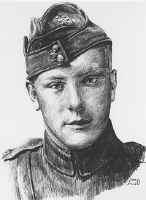Alan Arnett McLeod

Birth Date: April 20, 1899
Birth Place: Stonewall, Manitoba
Death Date: November 6, 1918
Year Inducted: 1974
Awards: VC
His winning of the Victoria Cross in aerial combat must be regarded as one of the most outstanding contributions possible to the military aspect of Canadian aviation
Becoming a Pilot
Alan Arnett McLeod, V.C., was born in Stonewall, Manitoba, on April 20, 1899. He received his education there and enlisted in the Royal Flying Corps (RFC), which had established training bases in Canada. In August 1917, having completed his Canadian training, he sailed for England where he underwent his operational training and joined No. 51 Squadron, RFC, as a Lieutenant on home defence duties. In November 1917, he was assigned to No. 2 Squadron, RFC, on the Western Front as pilot of a two-seater bomber on photographic, spotting and bombing missions.
A Daring Operation
He was honoured with a Mention in Despatches for a daring operation on January 14, 1918, when he and his observer, Lieutenant Reginald Key, attacked and brought down a heavily-defended observation balloon. They were set upon by three German fighters. However, Lieutenant McLeod, by skillful flying, placed his machine in a position to permit his observer full range of his gun to send one of the enemy aircraft down.
A Heroic Flight
The action for which Lieutenant McLeod was awarded the Victoria Cross came on March 27, 1918, shortly after the opening of the greatest German offensive that threatened to break the Allied lines. With six other planes from No. 2 Squadron, Lieutenant McLeod, flying an Armstrong-Whitworth FK reconnaissance aircraft, and his observer, Lieutenant A. W. Hammond, M.C., took off from their aerodrome in the morning for a bombing and strafing attack on German troop concentrations at Bray-sur-Somme, near Albert, France. Bad weather forced them near the ground where their aircraft was damaged by concentrated ground fire. Lieutenant McLeod returned across Allied lines, landed at No. 43 Squadron's field for repairs and took off again, reaching the target area shortly thereafter.
Victoria Cross Citation
The London Gazette of May 1, 1918, announced the award of the Victoria Cross (V.C.) to Lieutenant McLeod with the following citation:
"While flying with his observer, Lieutenant A.W. Hammond, M.C., attacking hostile formations by bombs and machine gun fire, he was assailed by eight enemy triplanes which dived at him from all directions, firing from their front guns. By skillful manoeuvering, he enabled his observer to fire bursts at each machine in turn, shooting three of them down, out of control. By this time Lieutenant McLeod had received five wounds and while continuing the engagement a bullet penetrated his petrol tank and set the machine on fire. He then climbed onto the left bottom plane (lower wing), controlling the machine from the side of the fuselage, and by sideslipping steeply kept the flames to one side, thus enabling the observer to continue firing until the ground was reached. "The observer had been wounded six times when the machine crashed in 'No Man's Land', and Lieutenant McLeod, notwithstanding his own wounds, dragged him away from the burning wreckage at great personal risk under heavy machine gun fire from enemy lines. This very gallant pilot was again wounded by a bomb while engaged in this act of rescue, but he persevered until he had placed Lieutenant Hammond in comparative safety, before falling himself from exhaustion and loss of blood."
Lieutenant Hammond received a Bar to his M.C. for his part in the action.
The Victoria Cross
Lieutenant McLeod spent many months in hospital. His father, Dr. A.N. McLeod, went to England to be at his son's side during his convalescence, and accompanied him to Buckingham Palace when he received his Victoria Cross from King George V. In September 1918, father and son returned to Canada. In late October, his lungs weakened by smoke and flames, young McLeod contracted influenza and died in Winnipeg, Manitoba, on November 6, 1918.
Alan McLeod was the youngest of three Canadian pilots to receive the Victoria Cross during the First World War. He was not yet 19 years of age and while most of the aerial VC's of the First World War were awarded to pilots flying single-seater aircraft, Lieutenant McLeod earned his decoration while piloting a bomber.
Alan Arnett McLeod was inducted as a Member of Canada's Aviation Hall of Fame in 1974 at a ceremony held in Edmonton, Alberta.
To return to the Inductee Page, please click here.
